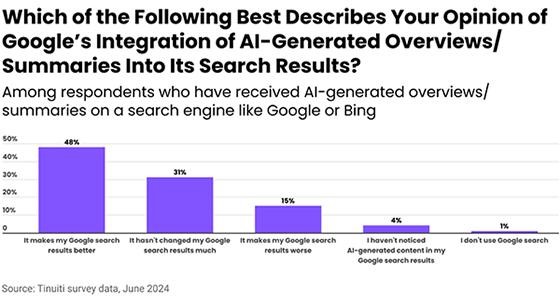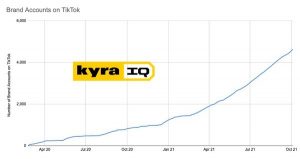AI-Infused Search Challenges Accuracy, Trust, Page Load Times

Forty-eight percent of people who have used artificial intelligence (AI) in search think AI-generated overviews and summaries make Google Search results better overall, but 15% say that using AI makes results worse, according to data released Tuesday.
Of those who think it has made search results worse, 47% say that sometimes it results in inaccurate information. About 43% do not trust AI-generated information, while 33% say it requires too much space on search results pages, 32% said it is more difficult to attribute information to the source, and 11% said page load times slow.
“How people think about Google AI Overviews was interesting,” said Andy Taylor, vice president of research at Tinuiti. “It would probably come as a surprise to most.”
Another surprising result, in my opinion, albeit low, 18% believe AI has already surpassed human intelligence. Some 6% believe it will surpass it within a year; 14% estimate one to five years; 15%, five to 10 years; 12%, more than a decade; 17%, never; 18% do not know.
Tinuiti, an independent performance marketing firm, analyzed how about 1,0000 users of AI think and feel about the technology in search, marketing and advertising to create the report, Public Perception of AI in Marketing. It provides overall stats, but also breaks down the data by generation, such as Gen Z, Millennials, Gen X, and Baby Boomers. The survey was fielded in June 2024.
Consumers have mixed feeling about how brands use AI-generated images, videos or text in marketing. Thirty-seven percent think it might be a scam, but 30% call it futuristic, 22% think the brands are smart, 18% don’t believe they should use AI, 17% think they are cheap, and 16% think they are cool.
Only 6% think they can tell an AI-generated image from a real photograph, 13% said very likely, 31% said somewhat likely, 28% said unlikely, 8% said there’s almost no change, and 14% didn’t know.
Forty-six percent said they would trust product recommendations from a chatbot without oversight, followed by 31% summarize email, 27% book a restaurant reservation, 27% summarize meeting, 22% respond to a text or email, and 17% book a hotel or short-term rental. Some 13% would even trust AI to make a purchase and 12% book a flight.
Some 48% would prefer that text serves as an answer to a search query on Google or Bing be pulled directly from one source or website or be the product of artificial intelligence.
Overall, 41% said AI has been mostly positive for the world, 35% do not have an opinion one way or the other, 14% said mostly bad, and 9% don’t know.
When asked to cite a preference for seeing a product ad online, 25% said an offer that appeals to people who share their general interest.
Twenty-three percent said an offer that appeals to the most people, 22% said a personalized offer based on past actions, 17% cited an offer that appeals to those with similar demographics, and 13% said one that AI has determined most relevant.
More than half of consumers participating in the survey want brands to protect their employees. Sixty-one with 61% saying they would feel more negative about the brand or business if they laid off workers to save money and use AI instead.
(6)
Report Post




